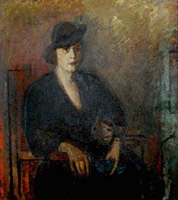
|
P U B L I C A T I O N S > R E M I N I S C E N C E S
It was in 1941 — in September — that Ary phoned me and introduced himself. He had had dinner the evening before with Dr. Lande, of Sioux City, who was on his way to England to serve with the Red Cross. Dr. Lande, who had taken me to dinner the previous evening, had asked Ary if he knew me (I was from Sioux City too, was born there) and they evidently had talked about me at some length. What really prompted Ary to call me I don't know; it was so unlike him. He always said later that our angels in heaven had gotten together. In any event, in five months (February 26, 1942) we were married, at the home of my cousins, Louise Adams and her husband Milton.
Ary's best man was a Russian friend whom he knew from Paris, an art dealer named Rabow. Rabow was a bachelor also, and neither Ary nor he knew anything about weddings, but Rabow vaguely recalled that it was customary to bring flowers to the bride. So the afternoon of the wedding they went to a florist shop. Rabow said he would buy the flowers. As they looked around they saw some very pretty flowering plants, and Rabow said it might be a good idea to bring a plant instead of flowers. Ary thought it would be a good idea, so that evening they arrived bearing a nice plant for the bride. Ary was dressed in a dark suit, but underneath it he wore the pretty light blue sweater I had bought him for his birthday a couple of weeks before. I looked at it aghast, but remembered I was marrying an artist, and I mustn’t be surprised at anything he did. And during the wedding supper when Ary became too warm in the blue sweater I helped him take it off. I have never seen anyone as nervous looking as Ary when he came in to the apartment, where a few of the family were gathered. His face was ashen and he was shaking like a leaf. I was frightened and terribly sorry for him, and I drew him aside and said: "Ary, it isn't too late to back out, if you don't want to go through with it." But he said no, he wanted to have the wedding. I knew that Ary hadn't married as a young man
because he wanted to be free to paint. He knew that if he had
the responsibility of a wife, and probably children, he couldn't
be absolutely free — he would have to compromise with his
ideals. In fact, Ary had warned me that his painting would have
to come first, that I would have to take second place to it.
It was so at first, I believe. But gradually I assumed more
and more importance to him, and his painting and I seemed to
merge into one. The second summer after we were married I received
a letter from Ary from Rockport, Massachusetts where he had
gone to get settled in a vacation spot (I was to join him later).
He wrote:
|
| © 2008 The Stillman-Lack Foundation, All text and images on this site may not be published, broadcast, or distributed in any form without the prior written permission of The Stillman-Lack Foundation. |
